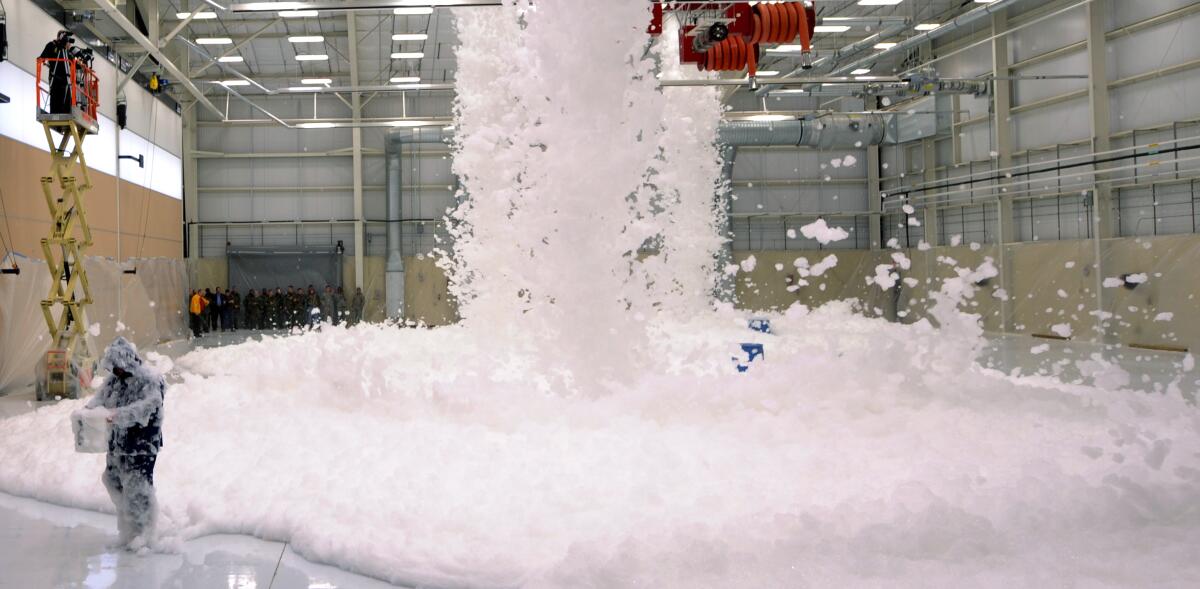Congress to halt military use of toxic foam contaminating drinking water

WASHINGTON — Congress has reached a deal on a spending bill that would require the military to stop using firefighting foam containing toxic chemicals linked to cancer, but would abandon efforts to place stronger regulations on the chemicals.
The bill, called the National Defense Authorization Act, has been the focus of intense negotiations for months. House Democrats saw it as their best chance to force President Trump’s Environmental Protection Agency to increase its oversight of a class of chemicals, called perfluoroalkyl and polyfluoroalkyl substances — commonly known as PFAS — that have contaminated drinking water sources across the country.
Senate Republicans resisted these measures, wary of forcing chemical companies and the Defense Department to undertake extensive cleanups.
But when hopes of a compromise faded last week, Democrats were left with little choice but to agree to significantly weaker provisions or kill the entire defense spending bill.
The bill that emerged out of a joint House-Senate committee this week had been stripped of measures that would require the EPA to designate the chemicals as “hazardous” and set a nationwide safety standard for PFAS in drinking water.
A proposal requiring contaminated sites across the country to be cleaned up under the Superfund program had also been removed, as had one that would limit how much PFAS chemical manufacturers could dump into water supplies.
A Times analysis in October found that California has 21 contaminated military bases, more than any other state, including six where the chemicals have leached into off-base drinking water supplies.
If the final bill is approved, it will force the Pentagon to phase out use of PFAS in firefighting foam by 2024, preventing more of these chemicals from contaminating the soil and water on military bases. Because of concerns about the chemicals’ toxicity and evidence they have migrated off-base into surrounding communities, the military says it has already stopped using this foam in training, but continues to apply it in aircraft fires.
The military would also be barred by 2021 from giving service members ready-to-eat meals packaged in containers treated with PFAS.
The bill, which passed in the House on Wednesday, will also require that the chemicals be added to the federal Toxics Release Inventory, which compels companies to report the type and quantity of the chemicals they are releasing into the environment. It will also expand monitoring for PFAS in tap water and groundwater.
Disappointed that Congress did not go further, environmental and public health advocates noted that although the bill may increase the public’s knowledge about these chemicals, it does little to prevent polluters from releasing more of them or to offer help to communities with contaminated drinking water.
“This is obviously a step forward,” said Andria Ventura, toxics program manager for Clean Water Action, an environmental advocacy group. “Now we need to start cleaning up the problem and figuring out what to do with the aftermath of the PFAS contamination. That’s where this initiative could have done better.”
The bill also sets policies for some $740 billion in defense spending and creates a “space force” as a new branch of the military, which was a top priority for Trump. Democrats, in exchange, won a provision giving federal workers up to 12 weeks of family leave, which is a major upgrade in benefits for government workers.
The final bill angered some Democrats who had promised they would not vote for a defense spending bill that didn’t contain tough PFAS provisions. This week, 68 members said they would vote against the bill.
House Majority Leader Steny H. Hoyer (D-Md.) said he would introduce a separate bill next month that would incorporate the excluded measures.
“The federal agency tasked with protecting public health from dangerous chemicals like PFAS has failed to do its job under this Administration, and the Trump Administration’s PFAS ‘action plan’ is all talk, no action,” Hoyer said in a statement this week. “That is why Congress must be a source of action.”
Since 2016, when the Environmental Protection Agency classified PFAS as an “emerging contaminant” linked to liver cancer and other health problems, the Pentagon has found the pollutants at levels above federal health guidelines in soil and groundwater at more than 90 bases nationwide.
Pentagon officials have said they are doing everything in their power to limit human exposure to the chemicals and provide safe drinking water to people whose tap water has been contaminated. But water sampling in communities near military bases has been limited and the military has chosen to act only when tests finds PFAS levels above the EPA’s health advisory level.
State testing in California has found traces of the chemicals in 300 drinking water wells and other water sources.
In a statement, Sen. Dianne Feinstein called on Congress to make another attempt to pass stricter PFAS regulations before the holiday recess.
“Congress must pass legislation this year to protect communities from dangerous chemicals known as PFAS that have been found to contaminate drinking water near California military bases,” she said.
More to Read
Get the L.A. Times Politics newsletter
Deeply reported insights into legislation, politics and policy from Sacramento, Washington and beyond. In your inbox three times per week.
You may occasionally receive promotional content from the Los Angeles Times.











